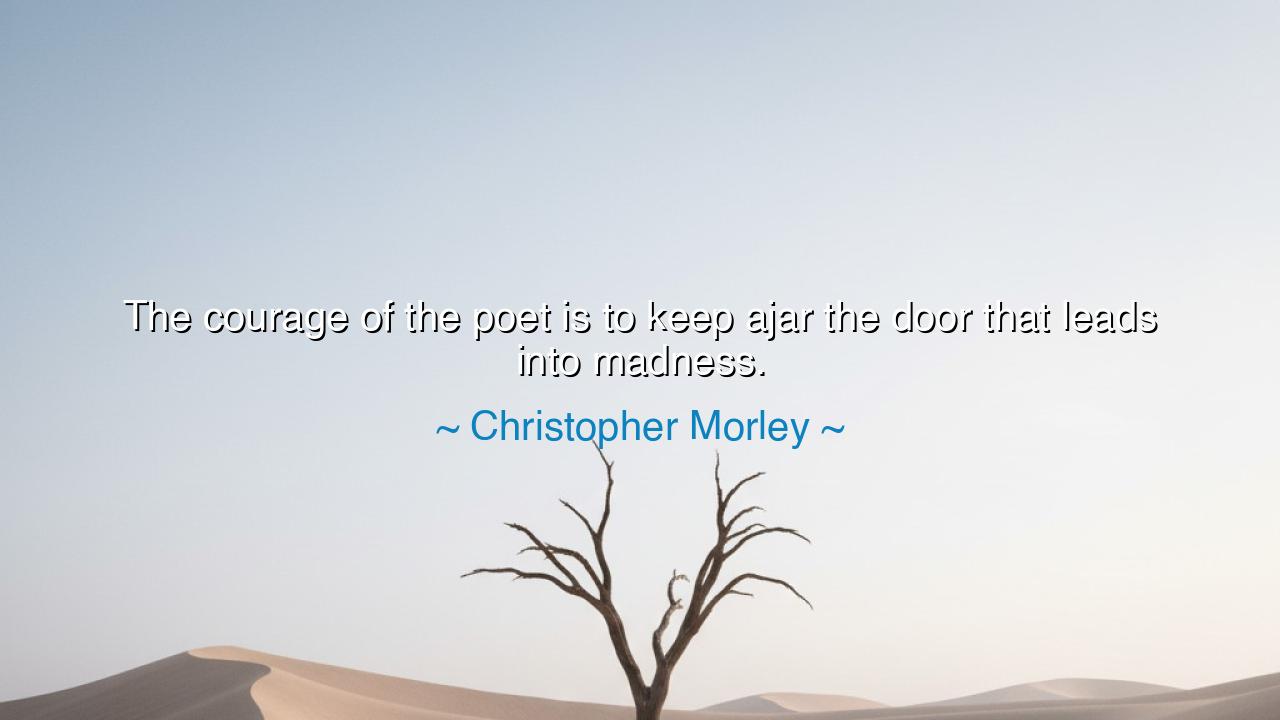
The courage of the poet is to keep ajar the door that leads into






"The courage of the poet is to keep ajar the door that leads into madness." So wrote Christopher Morley, a man who understood that to create truth from imagination is to walk the edge of light and shadow. In these words lies a sacred revelation: that the poet, the dreamer, the artist must stand where few dare to stand—between reason and chaos, between the known and the unknowable. For it is from that trembling threshold that beauty is born. The poet’s courage is not in wielding the sword or commanding armies, but in daring to look into the abyss of the soul and return with something radiant, fragile, and true.
To keep ajar the door that leads into madness is to live with the fire of inspiration always near—close enough to feel its warmth, but not so close that it consumes. Madness, in this sense, is not insanity, but the raw, unfiltered intensity of thought and emotion that dwells deep within the human spirit. It is the realm where ideas blur into visions, where pain transforms into art, and where the boundaries of logic dissolve into the infinity of feeling. The poet must not close that door, for from behind it come the whispers of creation—the voices that speak of truth too great for ordinary speech.
Yet such nearness to the abyss demands courage. Many live their lives safe behind walls of routine and reason. They dare not open that door, for they fear what lies beyond—the darkness of their own unspoken fears, their secret longings, their sorrow and ecstasy. But the poet, whether through words, music, or art, enters that shadowed place and gives it form. The poet risks losing themselves to bring back something that will save others: understanding, empathy, beauty. Thus, to write, to create, to dream deeply, is to dance on the edge of madness—and to remain just sane enough to share the vision.
Consider the life of Vincent van Gogh, whose paintings burned with the light of another world. He lived always with that door half open. In his colors and strokes, we see the trembling boundary between torment and transcendence. His sunflowers blaze not with mere pigment, but with the fire of a soul too sensitive for this world. He bore his suffering, not in silence, but in creation—and through that creation, his anguish became universal beauty. Van Gogh reminds us that the price of art is vulnerability, and that to face one’s own madness with courage is the highest act of honesty a human can offer.
The ancients knew this truth well. The Greeks spoke of divine madness, a sacred frenzy granted by the Muses. The philosopher Plato wrote that such madness was not to be feared, for it was the fountain of inspiration that lifts the soul beyond the mundane. To be too rational is to be lifeless; to be too lost in madness is to be destroyed. The true poet walks the narrow path between both, holding the door ajar—not open wide to chaos, not sealed against wonder, but slightly open, enough to let the light—or the lightning—enter.
For in truth, every human being has such a door within. Behind it lie the depths of our emotions, our fears, our dreams. The courage of the poet is simply the courage to look inward when others turn away. It is the strength to face the full measure of life—to see beauty in pain, humor in sorrow, and meaning in despair. The poet’s work is to make sense of the senseless, to weave words that soothe the madness of the world by transforming it into music.
So, my children of the future, remember this: to live fully is to keep that door ajar. Do not fear your emotions; do not silence the wildness within you. Listen to it, shape it, give it voice. Let reason guide your hand, but let passion guide your heart. For creation is born of balance—the steady flame that burns between chaos and calm. Be brave enough to look into your own abyss, but wise enough to return from it. In this way, you will not only survive the madness of life—you will transform it into art, and in doing so, you will touch eternity.






AAdministratorAdministrator
Welcome, honored guests. Please leave a comment, we will respond soon